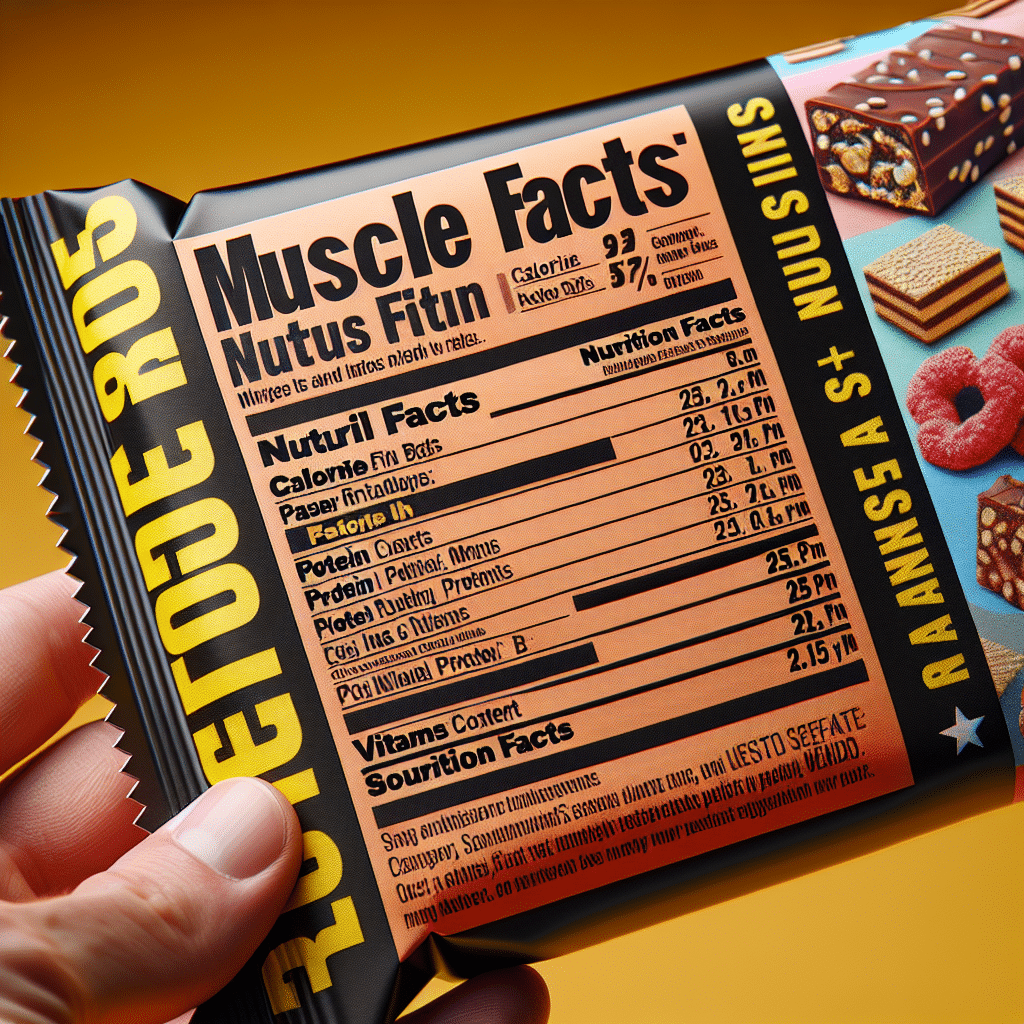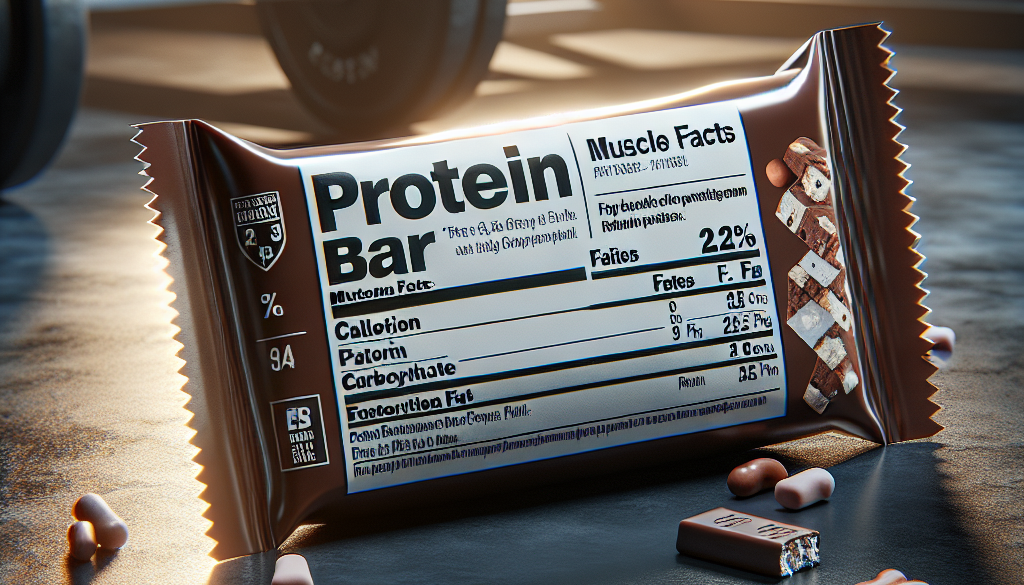Protein Bar Nutrition Label: Unwrapping Muscle Facts
-
Table of Contents
- Protein Bar Nutrition Label: Unwrapping Muscle Facts
- Understanding Protein Bar Ingredients
- Decoding the Protein Content
- Carbohydrates and Sugars
- Fats: The Good and the Bad
- Additional Nutrients and Additives
- Case Studies and Statistics
- Choosing the Right Protein Bar for Your Goals
- Conclusion: Making an Informed Choice
- Discover ETprotein’s High-Quality Protein Products
Protein Bar Nutrition Label: Unwrapping Muscle Facts

Protein bars have become a staple in the diets of fitness enthusiasts, busy professionals, and anyone looking for a quick, nutritious snack. They are convenient, portable, and come in a variety of flavors to satisfy different taste preferences. However, not all protein bars are created equal, and understanding the nutrition label is crucial to making an informed choice. This article will delve into the details of protein bar nutrition labels, helping you unwrap the muscle facts and make the best decision for your health and fitness goals.
Understanding Protein Bar Ingredients
Before we dive into the specifics of the nutrition label, it’s important to understand the common ingredients found in protein bars. These typically include:
- Protein sources: whey, casein, soy, pea, rice, or hemp protein
- Carbohydrates: sugars, sugar alcohols, fiber, and whole grains
- Fats: nuts, seeds, oils, and sometimes added trans fats
- Additives: flavors, sweeteners, preservatives, and thickeners
Each of these components plays a role in the overall nutritional profile of the bar, which is why it’s essential to read the label carefully.
Decoding the Protein Content
The primary reason for consuming a protein bar is to increase your protein intake. Protein is vital for muscle repair, growth, and maintenance, especially for those who lead an active lifestyle. When examining the protein content, consider the following:
- Amount of Protein: Look for bars with at least 10-20 grams of protein to ensure you’re getting a significant dose.
- Quality of Protein: The source of protein matters. Complete proteins contain all essential amino acids and are more beneficial for muscle growth.
- Protein-to-Calorie Ratio: A good protein bar should have a high protein-to-calorie ratio, indicating that a large portion of the calories comes from protein.
Carbohydrates and Sugars
Carbohydrates are the body’s primary energy source, but not all carbs are created equal. When looking at the carbohydrate content, pay attention to:
- Total Carbohydrates: This includes sugars, complex carbs, and fiber. Aim for a moderate amount that fits within your daily carb goals.
- Sugar Content: Excessive sugars can lead to energy crashes and unwanted weight gain. Opt for bars with low added sugars.
- Fiber: Fiber is essential for digestive health and can help you feel full longer. Look for bars with at least 3 grams of fiber.
Fats: The Good and the Bad
Fats are an essential part of a balanced diet, providing energy and supporting cell growth. However, not all fats are beneficial. Here’s what to look for:
- Healthy Fats: Nuts and seeds are excellent sources of healthy fats. These can help with satiety and provide long-lasting energy.
- Trans Fats: Avoid bars that contain trans fats, as they can increase the risk of heart disease and other health issues.
- Saturated Fats: While some saturated fat is okay, it’s best to keep it to a minimum. Check the label for low levels of saturated fat.
Additional Nutrients and Additives
Protein bars can also contain vitamins, minerals, and various additives. Here’s what to consider:
- Vitamins and Minerals: Some bars are fortified with additional nutrients. While this can be beneficial, it shouldn’t replace a balanced diet.
- Additives: Be wary of artificial sweeteners, flavors, and preservatives. These can have adverse effects on health and should be consumed in moderation.
Case Studies and Statistics
Several studies have highlighted the importance of reading nutrition labels on protein bars. For example, a study published in the Journal of Nutrition Education and Behavior found that participants who read labels consumed around 400 fewer calories per day than those who didn’t. Additionally, research indicates that consuming protein-rich snacks like protein bars can aid in muscle recovery and growth when paired with regular exercise.
Choosing the Right Protein Bar for Your Goals
When selecting a protein bar, consider your dietary needs and fitness goals. Are you looking for a meal replacement, a post-workout snack, or just a healthy treat? Your choice should align with these goals and fit into your overall nutritional plan.
Conclusion: Making an Informed Choice
Understanding the nutrition label on a protein bar is crucial to making an informed choice that supports your health and fitness objectives. By paying attention to the protein quality, carbohydrate content, types of fats, and additional nutrients and additives, you can select a bar that contributes positively to your diet.
Discover ETprotein’s High-Quality Protein Products
If you’re in search of premium protein sources, consider ETprotein’s range of organic bulk vegan protein and plant proteins. Their products are non-GMO, allergen-free, and feature a neutral taste, making them an excellent choice for various applications. Whether you’re a distributor, trader, or manufacturer, ETprotein can meet your protein needs with their extensive product range.
About ETprotein:
ETprotein, a reputable protein Chinese factory manufacturer and supplier, is renowned for producing, stocking, exporting, and delivering the highest quality organic bulk vegan protein and plant proteins. They include Organic rice protein, clear rice protein, pea protein, clear pea protein, pumpkin seed protein, sunflower seed protein, mung bean protein, peanut protein etc. Their offerings, characterized by a neutral taste, non-GMO, allergen-free attributes, cater to a diverse range of industries. They serve nutraceutical, pharmaceutical, cosmeceutical, veterinary, as well as food and beverage finished product distributors, traders, and manufacturers across Europe, USA, Canada, Australia, Thailand, Japan, Korea, Brazil, and Chile, among others.
ETprotein specialization includes exporting and delivering tailor-made protein powder and finished nutritional supplements. Their extensive product range covers sectors like Food and Beverage, Sports Nutrition, Weight Management, Dietary Supplements, Health and Wellness Products, and Infant Formula, ensuring comprehensive solutions to meet all your protein needs.
As a trusted company by leading global food and beverage brands and Fortune 500 companies, ETprotein reinforces China’s reputation in the global arena. For more information or to sample their products, please contact them and email sales(at)ETprotein.com today.














